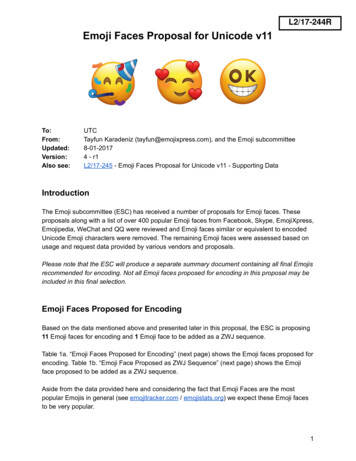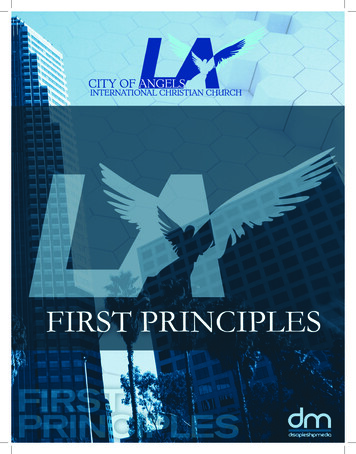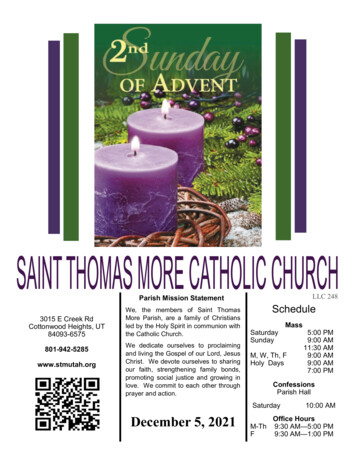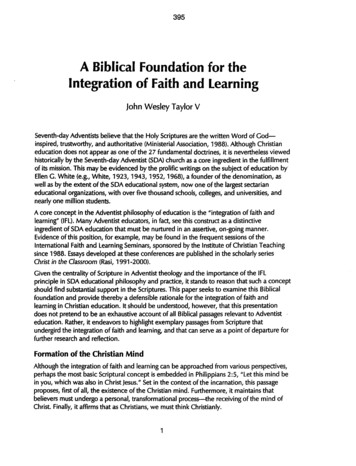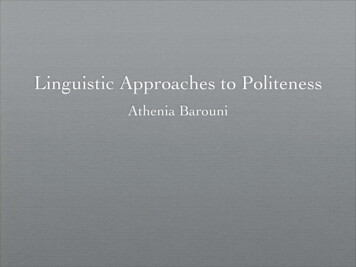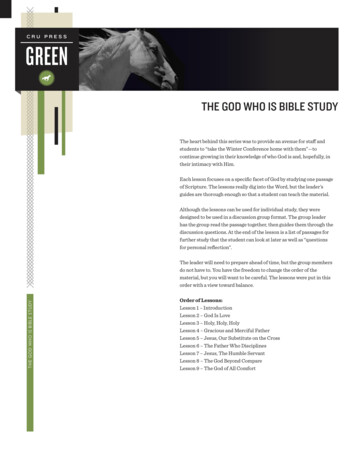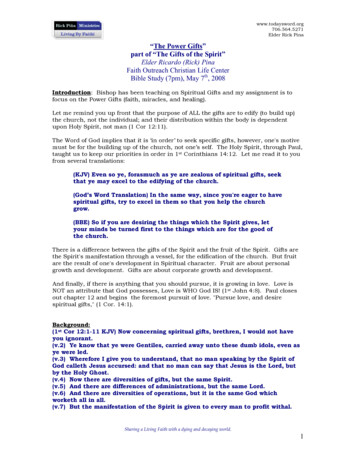
Transcription
SeekingGod’s FacePraying with the Biblethrough the Year
Unless otherwise indicated, all Scripture quotations are takenfrom the Holy Bible, Today’s New International Version (TNIV), 2001, 2005 by International Bible Society. All rights reservedworldwide.Seeking God’s Face: Praying with the Bible through the Year(compact version)Copublished byFaith Alive Christian Resources, 2850 Kalamazoo Ave. SE,Grand Rapids, MI 49560; phone: (800) 333-8300; website:www.FaithAliveResources.org.The Calvin Institute of Christian Worship, 1855 KnollcrestCircle SE, Grand Rapids, MI 49546-4402; phone: (616)526-6088; e-mail: worship@calvin.edu; website:www.calvin.edu/worship. 2010, 2012, by Faith Alive Christian Resources, 2850 KalamazooAve. SE, Grand Rapids, Michigan. All rights reserved. With the exception of brief excerpts for review purposes, no part of this book maybe reproduced in any manner whatsoever without written permissionfrom the publisher. Printed in China.ISBN 978-1-59255-768-410 9 8 7 6 5 4 3
ContentsAcknowledgments . . . . . . . . . . . . . . . . . . . . . . . . . . . . . . . . . . . . 5Foreword . . . . . . . . . . . . . . . . . . . . . . . . . . . . . . . . . . . . . . . . . . . 7Introduction . . . . . . . . . . . . . . . . . . . . . . . . . . . . . . . . . . . . . . . . 13How to Use This Prayer Book . . . . . . . . . . . . . . . . . . . . . . . . . . . 17Key to Abbreviations . . . . . . . . . . . . . . . . . . . . . . . . . . . . . . . . . 22Advent . . . . . . . . . . . . . . . . . . . . . . . . . . . . . . . . . . . . . . . . . . . . 23Christmas . . . . . . . . . . . . . . . . . . . . . . . . . . . . . . . . . . . . . . . . . . 81Epiphany . . . . . . . . . . . . . . . . . . . . . . . . . . . . . . . . . . . . . . . . . 107Lent . . . . . . . . . . . . . . . . . . . . . . . . . . . . . . . . . . . . . . . . . . . . . 233Easter . . . . . . . . . . . . . . . . . . . . . . . . . . . . . . . . . . . . . . . . . . . . 329Ordinary Time . . . . . . . . . . . . . . . . . . . . . . . . . . . . . . . . . . . . . 431
Fore word“Wendy, do you ever pray?”She shook her head negatively. “No. Never.” Then a shy, selfdeprecating smile played at the edges of her lips. “Sometimes Iwish upwards.”I didn’t know Wendy very well. I had married her and Jacob, ayoung man who was a member of my congregation, six monthsearlier. I met with them three or four times for conversations aboutmarriage and their understanding and expectations of it. I remembered that Wendy was quite open about having no Christian commitment and only the sketchiest acquaintance with church. Theywere both immature. I asked them if and when they found difficulties in their relationship that they come back and talk with me.Now she was back. I hadn’t seen her or Jacob since the day of thewedding. Things were not going well with their marriage; I wasn’tsurprised. I suggested a marriage counselor that I trusted.“Wendy, marriage is wonderful but complex, and being human iscomplex—a lot of things can go wrong. You and Jacob aren’t doingtoo well on your own. Dr. Shelly would be a good companion withyou as you learn how to understand and give yourselves to oneanother. You probably ought to think in terms of several months.”She wanted me to tell her what she could do on her own. Shewasn’t interested in “several months.” I never saw her again.But her sentence, “Sometimes I wish upwards,” stayed with me. Itburrowed into my imagination and has lodged there ever since asa wonderful naming of what I began to think of as “pre-prayer”—aspontaneous response “upwards” out of the self-enclosed nature tomeaning or fulfillment, or, who knows, God?“Sometimes I wish upwards” is a nudge towards prayer, an openingcrack of a door into mystery, a seed that if nurtured could soon7 v
become prayer. I am convinced that everyone wishes upwardssometimes, maybe even often. The wish upwards is evidence, I’vecome to think, that everyone has the stuff within them, the capacity, even the longing, to be a person of prayer. But also, more oftenthan not, nothing comes of it. The wish has no root in relationship,in language, in love, in God.The life of prayer doesn’t start from scratch. The wish upwardsis evidence of a readiness to pray. But how do we get from wishto prayer? How do we get the elusive, wispy, insubstantial wishembodied into actual prayer?This book, Seeking God’s Face, is one way. The Christian community in every generation has written and published daily prayerbooks to accomplish this transition among men and women,followers of Jesus, who want their relation with God and their family and friends and neighbors to be something more than a wishupwards.Daily prayer books take different forms and enter into differentcultures and times, but most of them share certain essential characteristics that provide congenial conditions for developing a life ofmature prayer, no longer praying by fits and starts, “clouds withoutrain . . . autumn trees, without fruit . . . wild waves of the sea . . .wandering stars . . .” (Jude 12-13).Seeking God’s Face melds prayer and Scripture into a companionable guide for becoming a participant—both listening andspeaking—in the great salvation conversation that is the Christiangospel.Prayer. Prayer is as natural and simple as language itself. The onlydifference between prayer and our mother tongue as we commonlyuse it is that in prayer God is a major voice. We all learn languagewithout formal instruction. We are wondrously created with allthe bodily parts in throat and mouth and ears that are necessary tospeak and listen. A prayer book respects this basic and elementaryat-home-ness, this aptitude that we all have for prayer. A prayerbook is not a book about prayer, not an explanation of prayer,not a theological essay on prayer. It is prayers, usually brief, tobe prayed.v 8
Prayer is a natural and authentic substratum of language. But thereis irony here: prayer, language at its most honest, is also the easiestform of language to fake. We discover early on that we can pretendto pray, use the words of prayer, practice the forms of prayer,assume postures of prayer, acquire a reputation for prayer, andnever pray. Our “prayers,” so called, become a camouflage to coverup a life of nonprayer.Set prayers are prayers provided for us to keep our praying in company with our ancestors, prayers of others so that we stay in touchwith the authentic world of prayer revealed in our Scriptures.They are prayers that we can use to distinguish prayer from prayerimpostors, fantasy, and magic. They are prayers that do not dependon our own initiative, prayers that don’t wax and wane accordingto the phases of our moods.In my home, a great deal of our common life is integrated intopreparing meals, considering the tastes and circumstances of thosewho will be present, setting the table, eating the meal, cleaning upafter the meal. No single meal is quite like another. They are manyvariables: the kinds of food that make up the meal, which members of the family will be there, guests that we anticipate. We enjoythe work. But occasionally we run out of energy and imagination.When that happens, we drive a few miles to a favorite restaurantin order to have someone else do it for us: shop for the food andprepare it, set the table, serve the meal, clear the table, and washthe dishes. A “set” meal: someone else whom we trust does it all forus. All we have to do is pick up the fork that has been set beforeus, eat the meal that has been set in place, and leave the cleanup toothers.When we are young children, all our meals are set meals, set beforeus without thought or preparation on our part. Gradually we learnto do it for ourselves and for others as we grow up. But it is stillnice to have someone do the work for us when we are tired orwithout appetite. The analogy to prayer is not exact but it is closeenough in this context.The classic set prayers for Christians and Jews are the psalms. Andthe most prayed prayer in the church is a set prayer, the Lord’sPrayer: “Pray then like this . . .”9 v
Scripture. All prayer is language—language in conversation, conversation between God and us. The most frequent distortion of prayertakes place when we fail to listen to God’s Word to us. We do allthe talking, demanding that God do all the listening.Scripture provides the major way in which God speaks to us.Scripture is a huge story with many voices, but the primary voice isGod’s voice. God has the first word. If we are going to get the storystraight, it is important that we let God have the first word, andreally listen; I mean really listen. Jesus’ story of the soils is a storyabout prayer: “He who has ears to hear, let him hear.”So if listening is required, silence is indispensable. Silence is acommonly overlooked element of language in general, but it mustnot be. Especially it must not be overlooked in the language ofprayer. It is not as if the Old Testament prophets and poets andthe New Testament apostles and Jesus—mainly Jesus, “the Wordmade flesh”—speak the revelation of God to us, and now in prayerwe get to say our piece. Silence in prayer, which consists mostlyin attentive listening, is nonnegotiable. Listening, which necessarily requires silence on our part, is as much a part of language aswords. The colon and the semicolon, the comma and the period—all of which insist on silence as part and parcel of speech—are asessential to language as nouns and verbs. But more often than not,silence gets short shrift in our prayers. Yet if there is no silence, ourspeech degenerates into babble.“But God doesn’t answer. Why don’t I get any answer?” It is themost frequent complaint regarding prayer. The obvious response is“Are you listening? Have you spent as much time listening as youhave speaking?”Only out of disciplined, quiet, attentive listening is it possible thento answer God’s speech in free prayers, unscripted—not “set” thistime—prayers responding to the story. We can respond as participants, as we experience our story being assimilated into God’sstory. “Let your Bibles become all autobiographical” is the way onepastor, Alexander Whyte, put it.For Scripture is not basically a book of information in which welearn about “the furniture of heaven and the temperature of hell.” Itis not for the most part a history book in which we learn all aboutv 10
the cultures of the ancient East. And it certainly is not a sciencetext in which we are instructed in the Second Law of Thermodynamics. It is a conversation between God and God’s people—us.God creating us and God saving us, while we are given generoustime to speak our belief and doubt, our praise and pain—whatever—and while we take our place in this marvelous story thatcomes together in the cross and resurrection of Jesus.Eugene H. PetersonProfessor Emeritus of Spiritual TheologyRegent College, Vancouver, British Columbia11 v
Ho w to U se Thi s Pr ay e r B o okEach day of prayer contains a number of different elements—an invitation into God’s presence, times of quiet, Scripture, freeprayer, a set prayer, and a closing blessing. All of this is meant tobe experienced as prayer. We may not be used to this way of praying, but think of it as an extended conversation with God—Godinvites you to be with him; you quietly enjoy his presence, listen tohis Word, and respond to him with the reality of your life; and Godsends you with his blessing.Of course, there is freedom within this form. Centuries ago Englishcleric William Law captured the right balance between our needof a form for prayer and yet the freedom we can enjoy in prayerto follow promptings from the Holy Spirit. His helpful direction isthat most “Christians ought to use forms of prayer at all the regulartimes of prayer. It seems right for every one to begin with a formof prayer. If, in the midst of his devotions, he finds his heart readyto break forth into new and higher strains of devotions, he shouldleave his form for a while and follow those fervors of his heart, tillit again wants the assistance of his usual petitions.”1I’ve attempted to make daily prayer simple. That doesn’t mean easy,just uncomplicated. I’ve often been frustrated with more complexand liturgical prayer books that require flipping pages, finding theright dates, and hunting down portions of Scripture. The mechanics of such over-involved praying became a barrier to actual prayerfor me. I’ve tried to avoid that in this book and have everythingyou need for one day’s prayer on one page.I’m assuming that most of us don’t have the luxury of stoppingseveral times a day for fixed prayer. Instead, I’ve tried to create asimple office that can be prayed in one session. The time you takecan vary, but I hope that you’ll leisurely enjoy God’s presence;1William Law, A Serious Call to a Devout and Holy Life (Philadelphia: Westminster Press1948), p. 91.17 v
don’t race through it, but linger with God. I’d suggest you start bycarving out twenty minutes for each day. But see how you mightexpand that time, enjoying the quiet, dwelling in God’s Word. Anddo think about setting up a regular time to pray. Pick out the timeof day when you are most alert and available to God.I imagine you will do this privately, on your own. Find a quiet andcomfortable place where you won’t be distracted. But consider thishopeful thought—there may be many others who will be praying with you. If we all pray this daily office together, we may doso privately and yet be connected as a wide community of prayer.Perhaps it might be good to find a local group of people to form asmall community centered on praying this office together. You canpray it on your own and yet know that each person is also prayingthe same prayers and meditating on the same Scriptures—thatmight help shape coffee conversations or online chats you havethroughout the week.On a macro level, the prayer book follows the seasons and celebrations of the Christian calendar—Advent, Christmas, Epiphany,Lent, Easter, Ascension, Pentecost, and Ordinary Time (there’s abrief introduction to each season at the beginning of that particularsection). The intention in following this calendar is to mark ourtime with Jesus, taking our lives and placing them in the story ofJesus, allowing the shape and rhythm of his life to shape our days.You’ll notice a box near the beginning of each prayer entry. SinceChristian seasons and holidays are not bound to our calendar, theymove around from year to year. The box is a simple way for you tofind the corresponding calendar date on which to pray your dailyprayer.Within each of the seasons, each day of prayer is a complete “office” to pray. Each day contains a number of elements for you topray with, either quietly or aloud. Again, consider the whole timeas prayer, a gentle conversation with the God who loves you.Invitation: we begin our prayers invited into God’s presence, welcomed into all the reality of the kingdom, of which we are so oftenunaware. The invitation is a way to open ourselves to the greatergospel reality, to become mindful of God’s presence.v 18
Quiet: there are two specific places where you’re encouragedto quiet your heart and mind, to enjoy stillness before God. Wehardly know what to do with silence in our wired world, withconstant communications intruding into our lives. For us to hearGod’s voice, we must regularly practice silence. Cultivating astilled, attentive heart before God and quieting down actual noiseand internal noise is a vital step in preparing to hear God’s voice.You can start with a brief period of silence, but experiment andchallenge yourself with longer times of quiet.Bible Song: each day there will be a psalm to pray. The Psalmshave always been the prayer book of God’s people—the “schoolof prayer,” as Augustine called them, teaching us to respond toGod. We’ll be praying a different psalm each day, working our waythrough the 150 psalms twice in one year. During some seasons,however, we’ll focus on a few specific psalms for the season.Allow the psalm to speak for you or expand your worship of God.There will be times when a psalm does not match or connect withyour immediate experience—you may hit a psalm of praise duringa difficult time, a lament on a spring day bursting with life. Allowthe psalm to move you beyond your immediate reality and experience, deeper into God’s reality. And remember you are praying witha wide community of Christians—a specific day’s psalm may notfit your circumstance, but it is expressing someone else’s experience. Perhaps someone in your church or neighborhood is goingthrough what the psalm is expressing. And it’s likely somethingyou’ll go through one day, so go to school now and learn how torespond to God with a full range of emotion.Bible Reading: every day has a further reading from the Bible, aword from God. The Bible readings will follow the particular season, allowing us to read through the story of God’s salvation. Thisis not a time to exegete the text or to read it for information, but tolisten for God’s voice for you, to allow God’s Word to address yourlife.Dwelling: this part of the prayer time may be a new way for youto encounter God’s Word and listen for his voice. It’s rooted in theancient Christian tradition called lectio divina, which is simply away to read the Bible, slowly, contemplatively, and leisurely, not19 v
seeking information but to hear the personal address of God. Lectiodivina assumes that prayer is a two-way conversation and enablesus to dialogue with Jesus by hearing and responding to the Wordof God.We’re used to studying the Bible, analyzing it for truths to understand or mining it for lessons to live out, but we are mostlyunschooled in listening to it. The goal of lectio divina is to grow incompanionship with God, to be a personal participant in the storyof God, lovingly listening for God’s Word, allowing the text to getinto us and read our lives.How does that happen? Each day there are a series of brief instructions to lead you through this way of listening to Scripture. But letme offer a quick overview.First, quiet yourself so that you can hear God. Then simply readthe Scripture, preferably aloud and slowly. As you do this, listen forthe word that addresses you—a word, thought, phrase, or imagethat grabs your attention, that jumps off the page for you. Don’tanalyze it or study it, but simply receive this word. (Turn aside anydoubts about whether this is God or your imagination; trust thatGod desires to be in conversation with you and is addressing you.)Then read through the same passage again and listen for the waythis word connects with your life. Reflect on how God is addressing your life. Next, enter into conversation with God. Honestly offer to him any feelings this text has surfaced in you, any resistanceyou feel, any comfort you sense. Ask Jesus, “Why did you give methis word today?” And then, finally, let this word sink deep intoyour life. Yield yourself to God’s direction and leading; rest in hispresence.Free Prayer: as a part of the prayer time, there’s opportunity foryou to speak your heart to God in a time of free prayer, bringing toGod the needs and concerns of your life, family, work, and church.It may seem like an oxymoron, but I’ve added a few suggestedprayer items for the free prayer, in case you are stuck or would liketo pray for something in addition to your personal needs.22I’m indebted to David Adam’s The Rhythm of Life. (Harrisburg, Penn.: MorehousePublishing, 1996) for the idea, and to The Worship Sourcebook (Grand Rapids, Mich.:Faith Alive Christian Resources, 2004) for some of the prayer requests.v 20
The suggested free prayer items are focused in a weekly flow ofseven daily groupings—Sunday: the resurrection of Jesus and ourexperience of the risen Jesus; Monday: the created world and ourstewardship of it; Tuesday: the incarnation of Jesus and our livingout the faith; Wednesday: the world and our local communities;Thursday: the Holy Spirit and spiritual renewal; Friday: the crossof Christ and those who suffer; and Saturday: the Church and ourlocal church family. Each week (usually Sunday) we’ll also pray theLord’s Prayer.Prayer: following the free prayer is a set prayer. Each of theseprayers is rooted in a Reformed confession of faith.3 The Reformedconfessions are a full and rich theological foundation for theChristian life—thoughtful and soul-nourishing. This is God-realitynamed clearly. They remain a convincing testimony, deep wisdomto be cherished and absorbed.But for many people I’ve met in my pastoral work, both Christiansand non-Christians, these confessions seem to have a diminishedcapacity to connect. The theology remains as relevant as ever, butwhether it’s the catechetical format, the historical distance, or thelanguage, the confessions seem removed from people’s experienceand daily lives.So why not take the living theology that feels remote and bring itclose by folding it into the most basic Christian activity of prayer?In these prayers, the content of faith is turned God-ward; it isChristian theology in a kneeling posture. Like honest prayer, sometimes the confessions question or lament, and other times theyconfess and praise, bringing all of our lives before the face of God.These historical confessions have provided Christians with a placeto stand firm, but they also give us a place to humbly kneel. Infact, those two postures are deeply connected; our personal creed,what we believe, is found and formed in what and how we pray(the Latin motto lex orandi, lex credendi). If we can begin to weavethese core Christian beliefs into our prayers, most likely we’ll find3The set prayers flow out of the Belgic Confession, Canons of Dort, HeidelbergCatechism, Westminster Confession, or Westminster Larger and Shorter Catechisms.Some are word for word renditions, others a prayerful paraphrase, and still others ariff on a phrase or thought from the confessions.21 v
them trickling into our minds, embedded in our hearts, and livedout in our lives.For some of us, this form of set prayer may be foreign and feel alittle stiff. Accept those feelings and yet try to stick with it, allowingthe prayers to give a larger voice to your spirit and to grow a fullerprayer life.Blessing: The time of prayer closes with a final blessing, remindingus of God’s good intentions for our lives, sending us out knowingwe live in the context of grace.Enough talk about prayer; now go and seek God’s face in prayer.Commune with Father, Son, and Spirit, and give my greetingsto God.Key to AbreviationsExampleExplanationBC 2Belgic Confession, Article 2CD 1.9Canons of Dort, First Point, Article 9HC 5Heidelberg Catechism, Q&A 5WC 8.2Westminster Confession, Chapter 8, Point 2WLC 6Westminster Larger Catechism, Q&A 6WSC 7Westminster Shorter Catechism, Q&A 7v 22
LentIntroductionLent, popularly understood as a season of joyless custom andduty, carries almost too much religious baggage for some people.How then do we keep the gospel front and center in this season ofshadows? The cross keeps our gospel focus clear. Lent is a seasonto journey with Jesus in his passion, to survey the cross, taking themeasure of Christ’s love in his suffering and death.Beginning on Ash Wednesday, Lent is the forty-day season leadingup to Easter. (If you count all the days, there are more than forty,but the Sundays are not counted as part of Lent, as they are resurrection celebrations held throughout the season.) It begins withthe stark reminder that “from dust you have come and to dust youwill return” and leads toward Jesus’ final week, marked by PalmSunday and stopping short of the resurrection celebration of Eastermorning. Ashes are a good emblem of Lent, a picture of our ownmortality and spiritual condition, a sign of Lent’s penitent spirit,and yet a hint of the hope of renewal.Celebration isn’t the word to use for our participation in Lent. It isa somber journey of spiritual preparation and renewal, marked especially by repentance and prayer. In our pain-averse culture, Lentstands apart by not shrinking away from suffering but cultivatingin us the wisdom that growth often (some might say only) comesthrough suffering. In a time and place of religious freedom, wherewe mostly don’t suffer for following Christ, Lent invites us to willingly identify with Christ’s suffering through fasting or other formsof self-denial.The spare and sober nature of Lent is healthy for the heart and trueto the gospel, scrubbing away frothy spirituality by calling us tosay no to ourselves in order to experience a greater yes in Jesus. Ithelps to imprint the form of the cross in our lives, recognizing thatthe news of the risen Lord Jesus is not good without the way of thecross. Lent prepares us to experience the reality of resurrection joy233 v
only by first recognizing the depth of our sin that pinned Christ tothe cross.During Lent, we’ll be praying through the psalms of the Passion.This collection of psalms (Ps. 22-30) is widely regarded in theChristian tradition as referring to Jesus’ passion. The first of these,Psalm 22, will be kept for Holy Week prayers, while the rest arearranged in a seven-day cycle that we’ll repeat each week duringLent.Lent has a fixed number of days, but since Easter is a moveablefeast, Lent begins at variable times on the calendar.v 234
3/9/2011Ash Wednesday2/22/20122/13/2013L E n T — /5/2025i n v i t at i o n“The Lord is gracious and compassionate,slow to anger and rich in love.” (Ps. 145:8)QuietBible Song: P salm 51:1-62/18/2026Have mercy on me, O God,according to your unfailing love;according to your great compassionblot out my transgressions.Wash away all my iniquityand cleanse me from my sin.For I know my transgressions,and my sin is always before me.Against you, you only, have I sinnedand done what is evil in your sight;so you are right in your verdictand justified when you judge.Surely I was sinful at birth,sinful from the time my mother conceived me.Yet you desired faithfulness even in the womb;you taught me wisdom in that secret place.Bible Reading: Joel 2:1-2, 12-13Blow the trumpet in Zion;sound the alarm on my holy hill.Let all who live in the land tremble,for the day of the Lord is coming.It is close at hand—a day of darkness and gloom,a day of clouds and blackness.Like dawn spreading across the mountainsv 236
a large and mighty army comes,such as never was of oldnor ever will be in ages to come. . . .“Even now,” declares the Lord,“return to me with all your heart,with fasting and weeping and mourning.”Rend your heartand not your garments.Return to the Lord your God,for he is gracious and compassionate,slow to anger and abounding in love,and he relents from sending calamity.QuietDwellingRead again slowly find a word or phrase that catches your eye ormoves your heart slowly repeat it pray your thoughts, desires,needs, and feelings from your meditation enjoy the presence ofyour Lord and Savior.F r e e Pr ay e r for our national and local communities for the continent of Africa for lobbyists and advocates for justice and peacePr ay e rHoly God, corruption is everywhere. For too long sin and disobediencehas been our master, ever since the fall of Adam and Eve. And still today,I look around and see this sin that poisons our life. We’re all naturalborn sinners, corrupt from conception on. And I stand as another generation of such born sinners. Lord, have mercy. Amen. (HC 7)BlessingRedeem us from all wickedness, purify us and make us your very own,eager to do what is good. (see Titus 2:14)237 v
3/10/20112/23/20122/14/2013L E n T — /6/2025i n v i t at i o n“The Lord is gracious and compassionate,slow to anger and rich in love.” (Ps. 145:8)QuietBible Song: P salm 51:7-132/19/2026Cleanse me with hyssop, and I will be clean;wash me, and I will be whiter than snow.Let me hear joy and gladness;let the bones you have crushed rejoice.Hide your face from my sinsand blot out all my iniquity.Create in me a pure heart, O God,and renew a steadfast spirit within me.Do not cast me from your presenceor take your Holy Spirit from me.Restore to me the joy of your salvationand grant me a willing spirit, to sustain me.Then I will teach transgressors your ways,and sinners will turn back to you.Bible Reading: isaiah 58:5-7“Is this the kind of fast I have chosen,only a day for people to humble themselves?Is it only for bowing one’s head like a reedand for lying in sackcloth and ashes?Is that what you call a fast,a day acceptable to the Lord?v 238
“Is not this the kind of fasting I have chosen:to loose the chains of injusticeand untie the cords of the yoke,to set the oppressed freeand break every yoke?Is it not to share your food with the hungryand to provide the poor wanderer with shelter—when you see the naked, to clothe them,and not to turn away from your own flesh and blood?”QuietDwellingLeisurely read again is there a word or idea that stirred withinyou? Linger over it and give it your attention is there somethingabout the reading you’d like to ask God about? Pray your life toGod take a moment to rest in God’s presence.F r e e Pr ay e r for spiritual renewal in this season of Lent for deep heart repentance for a genuine humility born of the gospelPr ay e rLiving God, I confess I have crossed your commandments of life; by mysin I’ve willingly separated myself from you, my true life. I’m damagedgoods. My guilt hangs like dead weight in my heart; I can feel the sentence of death, in my body and soul. There is no health in me. Lord, havemercy. Amen. (BC 14)BlessingRedeem us from all wickedness, purify us and make us your very own,eager to do what is good. (see Titus 2:14)239 v
3/11/20112/24/20122/15/2013L E n T — /20192/28/20202/19/20213/4/20222
v 8 become prayer. I am convinced that everyone wishes upwards sometimes, maybe even often.
